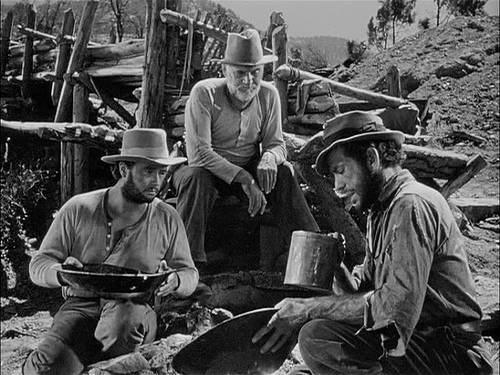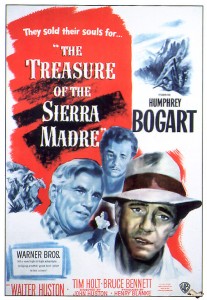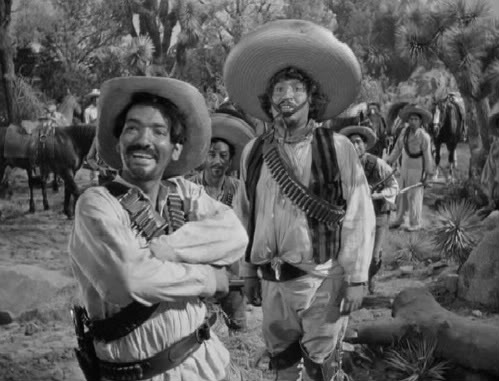Directed John Huston
Written by John Huston
U.S.A., 1948
Gordon Gekko, the central figure of Oliver Stone’s famous Wall Street, once uttered the phrase ‘Greed is good.’ That same individual was, understandably, also that film’s antagonist. To willfully adhere to the aforementioned philosophy is one thing, yet the reality of human frailty tells an altogether different, more subtle tale of ill advised deeds and nefarious scheming despite people continuously arguing for humanity common decency. John Huston’s directorial filmography includes some entries which explore that very theme, his most recognized success being 1950’s The Asphalt Jungle. Yet another came two years before, The Treasure of Sierra Madre, his second collaboration with actor Humphrey Bogart.
Dobbs (Humphrey Boggart) is not only down in Mexico, but down on his luck as well. Without nary a red cent to call his own, this bum is relegated to the streets, compelled to ask any Caucasian passerby if they can ‘stake a fellow American a meal.’ By happenstance he makes the acquaintance of two ex-pats, a fellow seemingly in the same age range named Curtlin (Tim Holt) and Howard (Walter Huston, the director’s father), an enthusiastic, talkative elderly man. All three are in dire need of some funds. Howard has been around, far more than the other two at least, and speaks of his past experiences in the field of gold digging. He may no longer be rich, yet he seems to speak with genuine enthusiasm and experience, which encourages both Dobbs and Curtlin to form a partnership with him, their goal being the hunt for gold in the Sierra Madre mountains far out in the hot, dry desert. A train ride and several days of hiking it on foot later with their burros and equipment, the trio finally arrive at their destination, but that is merely where their a new misadventure begins, for as the gold dust begins to accumulate, paranoia and mistrust rears their ugly heads. Who will make it back to town with their gold and who will be laid to rest with led in their stomach?
The rousing opening music piece (the score is from Max Steiner, who also worked on Maltese Falcon) which accompanies the film’s credits is a clear indication of what is to come. It is powerful, confident, adventurous, yet also slightly exotic and dangerous. It almost feels like can create a premonition in the mind of the audience. There will be much travelling, difficult, arduous travelling at that. What awaits the protagonists once they reach their destination may be heavenly just as it may result in their doom. That is John Huston’s film in a nutshell, a story about how men can turn on a dime simply because the opportunity to grab more beckons them. They are in a foreign land, the customs of which they do not entirely understand. They would best off by trusting in one another, setting aside greed and mistrust simply because fancy ideas enter their heads. What makes the disintegration of their alliance all the more frustrating is that it started off rather promisingly. All three men were completely broke, dependent on the help from strangers, and when they crossed paths, the acquaintances were made in good spirit. Dobbs and Curtlin needed Howard for the latter’s know how, leadership and experience just as the old enthusiast could never have made it as far as he gets without the help of the two much younger, ably built men, not to mention that all three were just desperate enough to venture crazily into the Mexican desert in an audacious attempt to fetch gold that, for all they knew, might provide with nothing in return. There was a sense of warmth, of camaraderie among the threesome at the start of their ambitious mission.
The camaraderie was not meant to last unfortunately. The dark clouds of greed get the better of the protagonists, Dobbs being the primary victim of its poisonous effects. His once positive outlook and sense of obligation towards his fellow men slowly melts away, leaving in its place the sort of antagonistic tendencies reserved for the dastardly villains of such plots. Why would that be? The answer should be obvious: because the lovable Dobbs whom viewers met at the start of the picture has become the villain, thinking of nothing but his share of the gold and how his two companions may try to relieve him of it, however unfounded his fears may be. Some may find this turn of events somewhat ‘on the nose.’ Director John Huston comes prepared in case of such a predicament in the way he handles the two other characters, Curtlin and Howard. The latter is old, wily and energetic in character but less so in physic, therefore incapable of running off with all the loot. This grounds him a bit more. Since he cannot make a move as effectively as the other two, he does not bother. His experience in years has also mellowed him out to the point where he understands the benefits of being as honest as possible. As for Curtlin, he is simply blessed with a different outlook. It is never explained, only revealed, but all information points to the fact that he is purer individual then Dobbs, with whom he shares a similar age group. Maybe it is his upbringing, or maybe his life experiences taught him different lessons than those that did for Dobbs.
The richness of all three amazingly different individuals rests of course on the script, an adaptation from B. Traven’s novel by director Huston himself, which is exquisitely detailed, but also the cast. Tim Holt, by the nature of his character Curtlin, who is more, shall we say, ‘normal’ than the other two, does not stand out as much even though the performance is quite good and sufficiently compelling. He earns the viewer’s sympathy the most, all in all. The two showier roles are awarded to Bogart and Huston senior. For some reason, showy performances are shunned in this young 21st century, as if it cannot, may not be considered serious acting. In truth, ‘showy’ is the possibility for an actor to inhabit characters one does not see everyday however, which is typically (there are exceptions to every rule) the point of going to the movies in the first place. Showy can and, in the opinion of this film buff, often is great. Yes, great. What beautifully showy and emotionally engaging performances Bogart and Huston give. In Sierra Madre, the Bogart of Maltese Falcon and Casablanca is non-existent. This Bogart tells kids to take a hike, he talks to himself like a crazy person when the paranoia sets corrupts his mind, he grows a wonderfully filthy beard, and he betrays his former friends at gun point. Welcome to the dark side. Walter Huston walks the fine line between being too obnoxious (within the realm of the movie) and completely lovable for his words of wisdom and the high pitched tone of voice with which he seems to sing and yell rather than talk. He has a thick southern-type accent down pat, to the point that, even after seen the film a couple of times now at this point, some lines of dialogue are still unclear to the ear. No matter, the viewer can get the gist of what Huston is muttering just by his enthusiasm and memorable looks. On whatever poster and DVD cover art that could be discovered, the actor playing the infamous Gold Hat bandit, Alfonso Bedoya, never receives top billing. This is perfectly understandable, given that Gold Hat plays but a minor role in the film, but some praise should be sent in his direction. Bedoya plays the part with such devilish glee, balancing both menace and comical.
By the end, everybody learns a lesson in way or another, with some receiving harsher lessons than others. The Treasure of Sierra Madre is John Huston at his masterful self, splendidly blending issues of moral dilemmas (how much and for how long can one continue to share when one is really hitting hard times?), a character based battle between the forces of good and evil, and a fun adventure film with nary a dull moment during its 126 minutes. Is greed really all that good? Not in real life, but it can make for a terrific movie.
-Edgar Chaput





